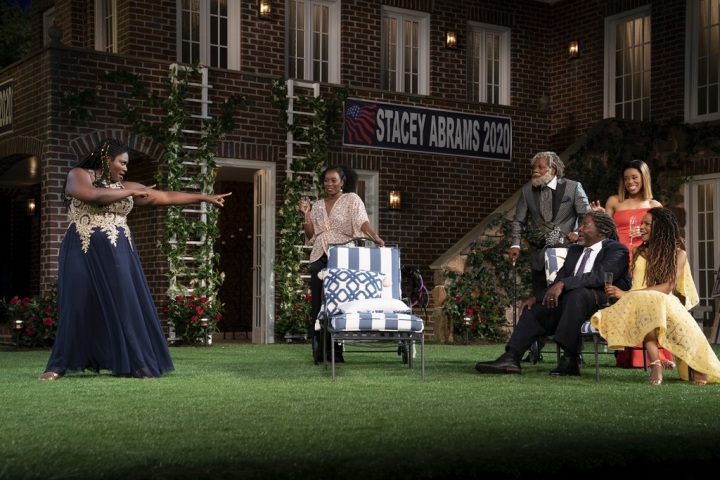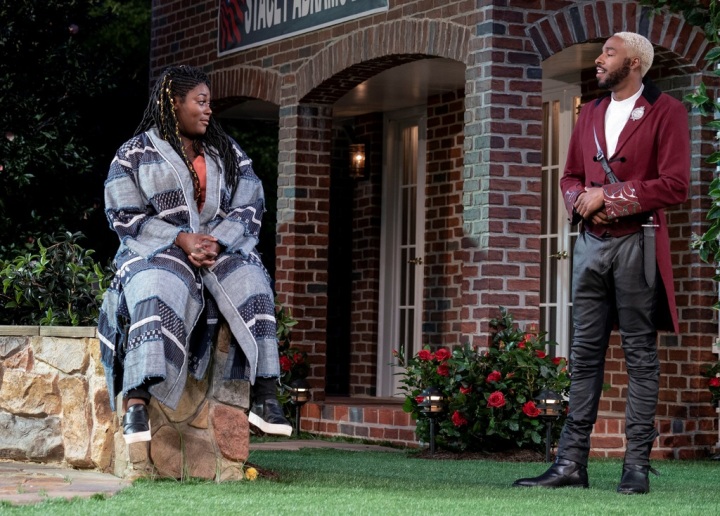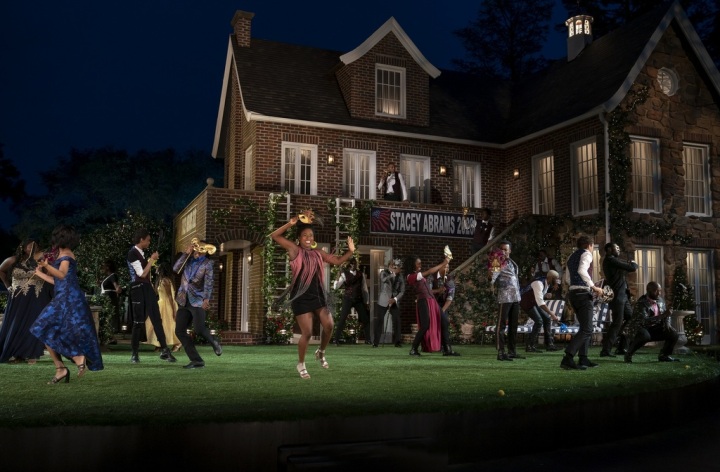
Michelena Hallie and I saw Kenny Leon’s production of William Shakespeare’s Much Ado About Nothing, the first offering of the 2019 season of Shakespeare in The Park. We attended on June 18, Tuesday evening during a light rain that the actors marshaled through with brio and professionalism. As a guest reviewer on this site, she weighs in on the production.
Much Ado About Nothing: A Glorious Antidote for Our Troubled Times
by Michelena Hallie
The divisive times we live in have inspired artists to articulate our anxieties, fears and anger, in an attempt to help us focus those emotions in a productive way. Or at least let us know we are not alone in our pain. Kenny Leon’s Much Ado About Nothing, currently running at the Delacorte Theater, is a stunning example of just such art. Placing the immortal text of Shakespeare in the volatile 2020 election year marries the battles, treachery, love and community of this classic with the turbulence of our times.
Leon’s legendary directorial portfolio is brought to full effect in the production. Placing the play in an African American suburb of Atlanta, Georgia in the Spring before the 2020 election explodes the themes of the play into the present. And the production wastes no time introducing its themes. A “Stacey Abrams 2020” sign is prominently displayed on the stately house which forms the backdrop of the play. Our heroine Beatrice masterfully performed by Danielle Brooks (Orange Is The New Black, The Color Purple), appears on the balcony above the sign and, together with friends, opens the play with an inspiring mix of Marvin Gaye’s “What’s Going On” (“Mother, mother There’s too many of you crying. Brother, Brother, Brother There’s far too many of you dying”) and “America the Beautiful” (“O beautiful for spacious skies, For amber waves of grain”). Fast forward to the group of men returning from a battle carrying signs such as “Hate is not a Family Value” and “Restore Democracy Now.” The specifics of the battle are not explained, but the tie to the presidential election and Black Lives Matter is unmistakable. This is not our grandparents’ Shakespeare.
The play then deftly switches from the divisive political backdrop to the more personal. We meet the starry-eyed lovers, Hero and Claudio, and the sharp tongued “adversaries” Beatrice and Benedick, as they dramatically enact their relationships.
Claudio, a young Lord who was one of the heroes in the reported battle, is smitten with Hero, the daughter of Leonato, the patriarch of the household. Leonato readily agrees to Claudio’s and Hero’s marriage and the wedding date is set. However, the evil Don John attempts to destroy the happy event by suggesting to Claudio that his beloved Hero is unfaithful, and offering to provide proof of her infidelity. Instead of defending his betrothed, Claudio responds that if he sees anything that would suggest he should not marry Hero, he will shame her at their upcoming wedding ceremony. And when Don John takes Claudio to the location where he has staged the false tryst, Claudio falls for the staging, and follows through with his threat. Without giving Hero an opportunity to defend herself, Claudio condemns her in front of the people gathered to celebrate their wedding. And Hero’s father joins the hasty condemnation. Only Beatrice, Benedick and the Friar question the accusation. The wedding is canceled and Hero is despondent and disgraced.
And then there’s Beatrice and Benedick – the sharp tongued would be lovers who hide their attraction for each other by throwing insults. Through machinations of their friends and family who want them to be happily married despite their protestations, Beatrice and Benedick fall in love. Brooks’ explosive performance and Grantham Coleman’s (“Buzzer,” “As You Like It”) energetic, funny and endearing turn as Benedick, depict the relationship as one of strength between equals. The couple are clearly not only very attracted to each other, but respect each other as peers. A stark contrast from Claudio’s treatment of Hero. In a particularly dramatic scene, Beatrice asks Benedick to avenge her dear cousin Hero’s mistreatment by killing his friend Claudio. The monologue Beatrice delivers on her inability to act because she is a woman is searing.

During these battles of the sexes and good and evil, it is friendship that keeps the communal bonds together. Beatrice never doubts her cousin Hero’s innocence. And through her vociferous defense she highlights the sexism that led Claudio to doubt his betrothed and Leonato to doubt his own daughter. What a powerful representation of the need for and power in the #MeToo movement. And through her pain and betrayal by her lover and her father, Hero too finds her own inner strength in a dramatic turn when Claudio realizes the falsity of his accusations and the innocence of Hero. Leon is able to inject Shakespeare’s story with staging of today’s hot topics, and bring vibrancy to both. And nowhere is that more dramatically exhibited than in the last scene of this masterful production. It may be a Shakespearean comedy, but the final scene pointedly returns us to the tumultuous times in which we live. A reminder that no matter how powerful our community is, we cannot live in a vacuum separate from broader society.
The production’s staging and modern day unspoken elements (Shakespeare may have been bawdy but even he would blush if he saw some of the moves between Beatrice and Benedick) are indeed masterful. But what also contributes to this amazing production is truly extraordinary acting. Brooks’ energy, passion, humor – and extraordinary voice – have molded Beatrice in to a modern day heroine. Coleman’s hyper, confused but lovable Benedick transforms the character from an arrogant and delusional oddity so often depicted in productions of the play to an endearing protagonist. And then there is Chuck Cooper (“The Life”) as Leonato, the warm patriarch who is temporarily blinded with a sexist assumption that his daughter Hero is impure, but is swiftly persuaded to test that assumption, clearly wanting to believe his beloved daughter is innocent.

Jason Michael Webb’s music and Camille A Brown’s choreography add to the drama of the production. At weddings, at celebrations, at memorials, the music and dancing not only introduce another contemporary element to the story, but move us to a higher emotional level. The vibrant music, the beautiful voices and the energetic dances leave the audience dancing and applauding in their seats.
The production is a masterful combination of the timeless words of Shakespeare and the powerful political, sexual and artistic forces of our times. It is truly the best of great art – it entertains and educates us. It is Shakespeare at his timeless best.
Much Ado About Nothing is 2 hours and 40 minutes with one intermission. It runs through June 23, 2019 at the Delacorte Theater, 81 Central Park West. For tickets and the lottery check the website by CLICKING HERE.